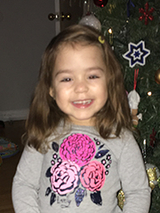Spina Bifida (Myelomeningocele): Emma’s Story
Spina Bifida (Myelomeningocele): Emma’s Story
The first time Beth Trahan drove from her home in Toronto to Philadelphia, it was on a wing and a prayer. Just a few weeks earlier, 16 weeks into her fifth pregnancy, a blood test that revealed there may be a problem in the pregnancy. The test found her unborn baby had a one in 32 chance of having a neural tube defect, one of the most common birth defects, which can affect the developing brain and spinal cord.
An ultrasound a few weeks later confirmed the baby had myelomeningocele (MMC), the most severe form of spina bifida, in which part of the spinal canal fails to close properly in utero. The open spina bifida defect permits damage to the exposed spinal cord and nerves due to the ravaging effects of amniotic fluid.
The genetic counselor who gave Beth the diagnosis left her with little hope. But fortunately, her midwife told her about a breakthrough fetal treatment for MMC available at a handful of hospitals in the U.S.
The fetal treatment is the result of a landmark National Institutes of Health-funded clinical trial co-led by the Center for Fetal Diagnosis and Treatment at The Children’s Hospital of Philadelphia (CHOP). The fetal team at CHOP actually developed the prenatal surgical technique and has the greatest experience in performing the procedure in the world.
Patient Outcomes
After researching fetal surgery online, Beth met with Dr. James Drake, a noted neurosurgeon and spina bifida researcher at the Hospital for Sick Children in Toronto, who recommended she go to CHOP. An amniocentesis and fetal MRI performed in Toronto found the condition was already causing leakage of cerebrospinal fluid through the open spina bifida defect, resulting in the brainstem moving down into the spinal canal in the fetus’ neck. This condition — called hindbrain herniation — can lead to hydrocephalus, a life-threatening buildup of fluid that can injure the developing brain.
From Canada to Philadelphia
CHOP’s Department of International Medicine worked with Beth and her local physicians to help arrange her visit to the Center for Fetal Diagnosis and Treatment. The International Patient Services team extends the resources of the Hospital to families from around the world, and helps to coordinate care, assist with travel arrangements, and offer any other support international families may need in preparing to come to Philadelphia.
Beth arranged to have her two oldest children looked after and drove to Philadelphia with her husband and two youngest kids — ages 2 and 8. Three days later, she underwent fetal surgery. All went well with the surgery, but seven days later, while still in Philadelphia recovering, Beth experienced chorioamniotic membrane separation — a complication of fetal surgery that can lead to preterm delivery.
Fetal Surgery at CHOP
She was readmitted to CHOP, received medication to prevent preterm delivery and was carefully monitored. After two weeks, as her husband and children drove back home, Beth was flown by air ambulance to Mount Sinai Hospital in Toronto, where she spent the remainder of the pregnancy on strict bed rest.
“It was scary,” recalls Beth. “But the doctors at CHOP stayed in touch with my doctors in Toronto the whole time; they talked every couple of days. And the Center connected me to an online network of other women who had gone through or were going through a similar experience.”
In week 32, a placental infection caused Beth to go into early labor. Emma Trahan was born weighing 4 pounds, 4 ounces. She spent her first 12 hours of life on a ventilator and a few weeks in the NICU, but an MRI to evaluate her spine and brain found good news: fetal surgery had reversed the hindbrain herniation and there was no hydrocephalus.
Checking in on Emma

The next time Beth drove to Philadelphia, she brought five children along with her, and the occasion was a happy one: the Center for Fetal Diagnosis and Treatment’s Annual Fetal Family Reunion.
“We had a blast,” says Beth. “I was so happy to meet other parents that I had been talking to online who really helped me. And it was great to see the doctors who I owe so much to. I feel forever grateful for what they did for me and for Emma and for our whole family.”
Now 3 years old, Emma has some medical issues but she is doing amazing overall, according to her mom. She is attending a preschool that focuses on physical and fine motor skill development, and will be starting junior kindergarten in fall 2017 with a regular class.
Emma will need surgery for tibial rotation sometime this year, and wears ankle foot orthotics (AFOs) to keep her feet straight and provide added support. But she doesn’t let any of that slow her down, and walks without assistance form a walker or arm crutches.
While she has reflexes in her ankles, she can’t feel the bottoms of her feet — but she’s developmentally on track for her age, and her neurologists have cleared her for three years, says her mom.
Emma has also had a number of urinary tract infections, and her physicians in Canada hope video urodynamic testing will explain why, but ultrasounds of her kidneys have all come back normal.
“She’s just great,” Beth says. “She became a big sister in August and is so helpful and loving.”
Originally published December 2014
Updated December 2016